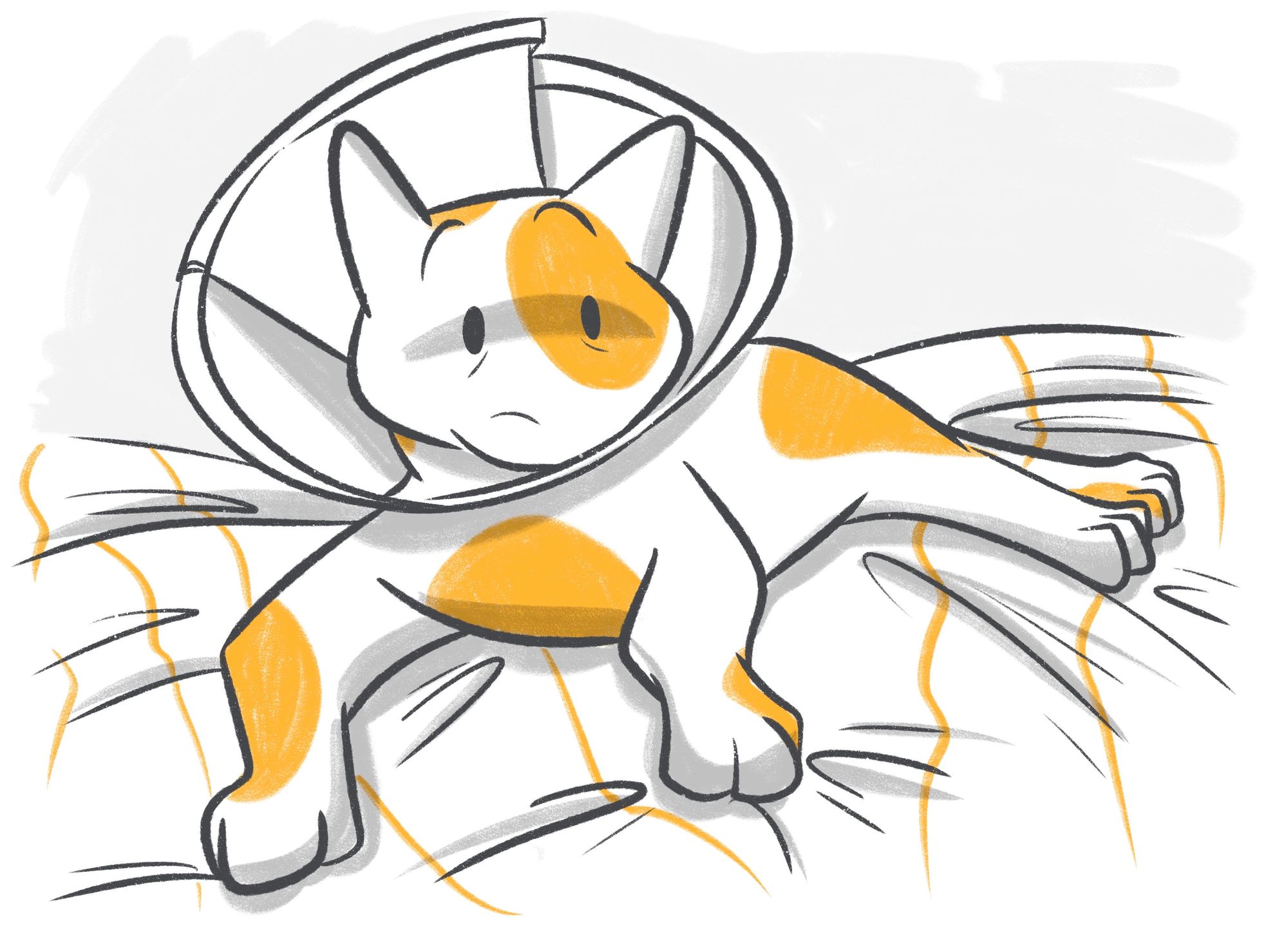As a pet owner, you should, if you haven't already done so, consider spaying or neutering your pet. Spaying and neutering describe the small operation performed on female and male pets in which their reproductive organs are removed.
In male pets, a small incision is made to remove the testicles, while in females, a more extensive operation is required to remove their ovaries and uterus.
The benefits of spaying and neutering far outweigh limiting the animal's potential to breed. According to Frontiers study, sterilized pets are generally healthier and live longer than their unsterilized counterparts.
If you're a pet parent on the hunt for some answers, read on. We'll cover all the answers to the most common questions about spaying and neutering pets. Certain types of ovarian and uterine cancers, as well as testicular and prostate diseases, are prevented.
Spaying and neutering also eliminate certain unwanted behaviors like spraying, roaming, and that embarrassing leg humping on all our guests.
Content:
- When Should You Spay or Neuter Your Pet
- How Will Spaying or Neutering Affect Your Pet Behavior
- How Much Does It Cost to Spay or Neuter Your Pet
- Does an Emergency Fund Cover Neutering or Spaying
- How Long Does It Take To Spay or Neuter a Pet
- Final Thoughts
When Should You Spay or Neuter Your Pet
The general rule of thumb when spaying and neutering your pets is that in females, this should occur before their first heat, and in males, before they reach sexual maturity.
When to spay a cat
In cats, females are usually spayed at around five months old, while males are neutered at approximately six or seven months old. Can a cat be spayed while in heat? Technically, yes. But the chances of complications increase, so waiting a week or two after their heat is safer.
When to spay a dog
Female dogs are typically ready to be spayed by about six months of age, and male dogs should be neutered between the ages of five and ten months, depending on their breed and size. How long do you have to wait to spay a dog after a heat? Usually, it's best to wait two to three months after the heat cycle has completed.
The following are signs that your dog needs to be neutered or spayed:
- You live in a region where the law states that your dog must be neutered;
- Your dog is aggressive;
- Your dog marks his territory, so everything smells of pee;
- Your dog is an escape artist and somehow always manages to get out (hint: a male dog can smell a female in heat up to three miles away);
- Your dog's genetic defect can be passed on to its offspring. These include hip dysplasia, elbow dysplasia, epilepsy, hypothyroidism, genetic heart problems, cancer, and intervertebral disk disease.
If you're ever in any doubt, your veterinarian will be able to advise on the best time for your pet.
How Will Spaying or Neutering Affect Your Pet Behavior
A common concern among pet parents is that having your sweet fur child fixed will cause significant changes in their behavior, leaving you with an animal you no longer relate to. Rest assured that sterilization is just that — eliminating the ability to procreate. It's not a lobotomy.
If your pet was a loveable goofball before the surgery, they will be a loveable goofball after. Your curious and bouncy best friend will be the same without their reproductive bits as before.
Spaying and neutering are often recommended for dogs that tend to be aggressive or, how shall we put this, overly romantic. If your pet is humping every leg it comes across, sterilization can decrease this drive. And, in aggressive dogs, neutering can lessen the aggression.
Male cat behavior after neutering usually involves less spraying, much less roaming around and returning home with wounds from a fight.
Does neutering a dog calm them down? Neutering an aggressive dog can result in lower testosterone levels, leading to lower aggression in dogs.
Will spaying or neutering my pet make them fat? This is a common misconception. While your pet may require fewer calories after sterilization (roughly 20% or so less), they will not necessarily put on weight if they receive appropriate portions and adequate exercise.
If you see the pounds starting to pile on, reduce portions or change your diet while adding in an extra walk or two.
Stop Googling - Ask a Real Vet
A great way to keep an eye on your beloved pet while you're out is with a PetCam. With excellent camera quality (including night vision) and two-way sound, these handy gadgets allow you to observe your pet and keep an eye on them when you're not able to be at home.
How Much Does It Cost to Spay or Neuter Your Pet
The cost of spaying or neutering your pet can vary depending on various factors. Your pet's size, breed, age, and sex can all impact the price of the procedure, along with other elements, including your vet's fees. The cost to spay a large dog is much higher than the cost to neuter a cat.
Whatever the final price, the benefits far outweigh this once-off cost. A happier, healthier pet is worth every penny. When considering the cost of having a litter, things are put into an even harsher perspective. When your pet falls pregnant, you're in for two months of ensuring the health of the mother and her young and a further two months while the litter is weaned — that's vet bills and food costs until the little ones are ready to be rehomed.
Pet parents who cannot afford the procedure can reach out to their veterinarian; they may offer or know someone who offers low-cost spay and neuter services. Some local agencies and programs also provide these services at a reduced rate, so you may need to do some research, but help is at hand.
Does an Emergency Fund Cover Neutering or Spaying
Standard pet insurance usually covers unexpected illnesses and accidents, while Emergency Fund only kick in to cover life-threatening instances. Because neutering and spaying pets are planned and elective procedures, they're most often not covered.
While an emergency fund won't assist you with spaying and neutering, it's still an invaluable resource to have during those times when the last thing you wish to think about is finances.
Petcube's Emergency Fund pays out up to $3000 per year in an emergency and includes access to a 24/7 online vet service. A team of veterinarians is at your fingertips anytime, day or night, to answer any questions and provide you with advice. All for the affordable price of just $29 a month.
How Long Does It Take To Spay or Neuter a Pet

How long does spaying take? Spaying surgery can take 20 minutes to an hour and a half or longer. The operation depends on the animal's size, age, and breed. Larger dog breeds will take longer and require more than one surgeon.
How long does neutering take? Neutering is a much simpler and less invasive surgery that takes less time. Not just in the operating theater, but recovery is much faster too.
But the surgery is just the first part. Your pet will need time to recover from their surgery, too. Animals can have some peculiar reactions to the anesthetic, so your cat may be a little loopy for a while, and your dog may behave differently than usual until it has entirely worn off.
Spaying requires a larger incision and stitches, so the healing can take a little longer. Of course, a cat or dog that can't leave the wound alone (continuous licking and nibbling at the stitches) can delay recovery and may require the dreaded cone of shame.
Read more: Why Are Dogs Licking Their Paws?
Final Thoughts
Spaying and neutering your pet is your responsibility as a pet owner. The benefits of sterilization include reducing the risk of certain cancers, eliminating unwanted behaviors, and helping pets live longer healthier lives.
The general rule of thumb is to spay females before their first heat and neuter males before they reach sexual maturity.
Many pet owners are concerned that sterilization will change their pet's behavior, but rest assured that the surgery only limits your pet's ability to reproduce and won't drastically change their personality. It can even benefit from lessening aggression and spraying.
Although the cost of the procedure can vary, it is a once-off cost that is far easier to bear than caring for a litter of kittens or puppies.
If you have any concerns or are in doubt about the best time to spay or neuter your pet, your vet can provide guidance and recommendations.
Was this article helpful?
Help us make our articles even better









